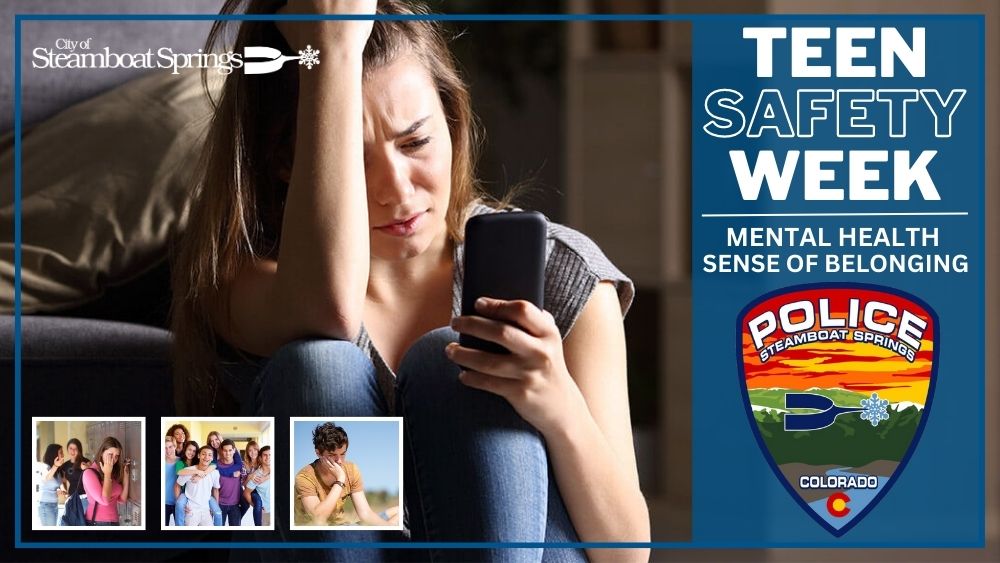
This is Teen Safety Week. It’s a program that supports teens by bringing awareness to the social challenges they face, and then connecting them and their parents with tools and resources that are available in the community. The Steamboat Springs Police Department is partnering with local agencies and non-profits during Teen Safety Week.

Thursday, May 11, everyone is invited to the Teen Safety Fair. It’s from 4-6 p.m. today at the Steamboat Springs Community Center. Here’s interim Steamboat Springs Police Chief Mark Beckett.
“Historically, around this time of year, with proms and different graduations going on, we see an increase in accidents and alcohol and drug related incidents with kids. This is an opportunity to educate, reach out to our kids, and talk to them about the importance of making good decisions.”
Program partners, local agencies, and non-profit organizations will host tables and be on hand to share valuable information and resources in a casual meet-and-greet atmosphere. Members from Steamboat Springs Fire Rescue will also be on hand to demonstrate life-like scenarios of extraction on a mock car crash.
For information or to get involved, visit www.steamboatsprings.net/teensafety, or contact:
Patty Oakland with Steamboat Springs Police Department
Email Patty Oakland | 970.457.7414
Teen Safety Week – Substance Misuse/Abuse
Hey, Teens! As your brain matures, it becomes more focused on rewards and taking risks. At the same time, teens are pushing parents for greater freedom as they explore their personalities. This time can be a challenging tightrope to walk for both teens and parents. Your brain is developing in ways to set you up to be an independent adult, but there are still a lot of ways your parents/guardians and community want to support you in developing strong skills for successful independence.
Right now, your brain is developing faster and more efficient ways to process information, called “use-it or lose-it”. Therefore, your use of substances is linked to the highest risk for developing a substance use disorder, while simultaneously “losing” connections with key memory abilities. Learning (which is a lifetime skill) is negatively impacted by substance use as a teenager, especially when use is frequent and heavy.
The CDC reports that 15% of high school students report having used illicit or injection drugs, and 14% of students have misused prescription opioids. Teens who experiment with drugs and other substances put their long-term health and safety at risk.
Common risk factors for teen drug abuse include:
- A family history of substance abuse.
- A mental or behavioral health condition, such as depression, anxiety, or ADHD.
- Impulsive or risk-taking behavior.
- A history of trauma, such as being in an accident or experiencing abuse.
- Low self-esteem or feelings of social rejection.
Teens are more likely to try substances for the first time when hanging out in a social setting. Teens generally want to fit in with peers, so if their friends are using substances, they might feel like they need to as well. Substances may also be used to deal with feelings of loneliness and stress or may try a substance as a way to rebel. Know how to recognize the warning signs of teen drug abuse and seek professional help if you think your teen may be abusing or misusing substances.
Warning signs of teen substance abuse/misuse:
- Sudden or extreme changes (friends, eating habits, sleeping patterns, physical appearance, requests for money, school performance).
- Irresponsible and out of character behavior, poor judgment, general lack of interest.
- Breaking rules or withdrawing from friends and family.
- The presence of medicine containers or drug paraphernalia.
It is important to talk about substance abuse and misuse. Teens who use illicit drugs or misuse prescription drugs are at a high risk of injury, risky sexual behaviors, dating violence, criminal justice involvement, school dropout, mental health problems, and loss of life.
Tips
- Talk to your teen.
- Encourage honesty.
- Focus on the behavior, not the person.
- Know your teen’s activities, where they spend their time, who they spend time with, etc.
- Establish rules and consequences.
- Check in regularly.
- Keep track of prescriptions drugs and over-the-counter medicines in your home.
- Set a good example – use prescription drugs as prescribed, over-the-counter drugs as labeled, and don’t use illicit drugs.
- Get professional help. If you think your teen is using or misusing drugs, contact a health care provider or counselor for help.
Resources
- Colorado Crisis Services
- CDC – Substance Abuse Among Youth
- IMatter